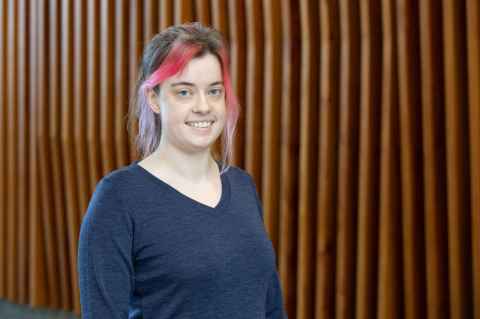Tori Peters
Tori is following her love of microbes to study a PhD in Biomedical Science targeting chronic rhinosinusitis (CRS).

“I always loved biology at school, it was the topic that interested me the most, particularly where there was medical relevance. However, I was less interested in being a doctor and more interested in the research side of things. As I continued my study, I found I loved microbes above all other topics.
"I decided that I wanted to be a researcher, and a crucial step in that process is having a first real research project in the form of a PhD. The topic I’m studying is the perfect project for me – I’m interested in microbiology as it relates to health, so having this intersection of microbiology and pharmacology is exactly the sort of research I want to conduct in the future in my career.
"My research is looking at chronic rhinosinusitis (CRS). CRS sufferers can experience three or more months of facial pain and/or pressure, nasal blockage or discharge, and reduced smell and taste. Recurrent CRS can be due to bacterial infections that group together and create a matrix around themselves, collectively referred to as a biofilm, which increases resistance to antibiotics. As you might guess from my love of microbes, I am most interested in the biofilms themselves and how to eradicate them, preventing recurrent infections of CRS. To do this, I am creating an antibiofilm agent that CRS sufferers can spray into their nose to destroy the biofilms.
"Biofilm infections are much more difficult to treat than regular bacterial infections. We really do not have the tools to combat them. I hope that my research will help CRS patients who simply cannot get relief from their condition, and perhaps further down the road, it could be modified to target other biofilm infections like chronic wounds.
"In the future, I hope to target antibiotic resistance in bacteria which is on the rise globally. Bacteria have many methods of resistance, and seem to be constantly devising new ones, so a multi-pronged approach is needed. If I can contribute to reducing the load of antibiotic-resistant infections, that would be amazing.
The most rewarding part of my PhD journey has been being able to produce research that is original and my own, creating something new that doesn’t already exist in the world. I have enjoyed putting my critical thinking skills to task as I develop and evolve methodologies for my experiments and address arising problems.
"It takes a village to do a PhD. For anyone considering doctoral study, I would strongly encourage having a good support system and things you’re interested in outside of your thesis. Share your research with people around you and in different departments; collaboration brings innovation, and explaining your research to people outside of your niche helps with general science communication skills.”